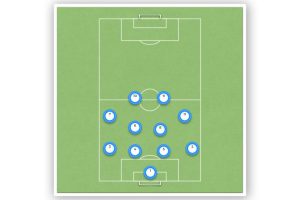Developing A Soccer Coaching Philosophy
Soccer is a game of skill and strategy. It requires knowledge, practice and dedication to succeed at the highest levels. Developing a soccer coaching philosophy can be an effective way for coaches to create a successful team culture that promotes individual growth and development in players. A well-crafted soccer coaching philosophy should provide guidance on how best to achieve success both on the field and off it. In this article, we will explore what constitutes a strong soccer coaching philosophy as well as the benefits of creating one.
How to Develop a Soccer Coaching Philosophy
The process of developing a soccer coaching philosophy involves setting objectives based upon personal values and beliefs about the sport. This includes determining which strategies are most likely to help players develop their skills while also encouraging them to reach their fullest potential as athletes. Furthermore, it should take into account factors such as team dynamics, player mentalities, motivational techniques, organizational structure and more. By taking these considerations into account when formulating a coaching philosophy, coaches can ensure they have created an environment that allows players to perform optimally yet still feel supported by their peers and coaches alike.
Finally, having an established soccer coaching philosophy is beneficial because it helps teams stay focused on achieving their goals throughout the season. It serves as a reminder for coaches of why they coach in the first place – namely, helping others become better versions of themselves through hard work and determination – while providing clarity and direction for all members involved with the organization from top to bottom. Ultimately, building a foundation based on trust, respect and perseverance is crucial for any successful program over time; therefore, understanding how to build such principles into your own unique approach is key in establishing yourself as an effective leader within the competitive world of soccer coaching today’s youth athletes.
Want to learn more? Youth Soccer Coach 101

Understanding Your Coaching Values
When it comes to soccer coaching, the most important factor is understanding one’s own values. A coach must determine what they believe in and how those beliefs can be applied to their players’ development. In order to do this, a coach should consider three main aspects: soccer values, coaching values, and player development.
Soccer values involve ethical principles such as respect for teammates, opponents, referees, and coaches; fair play; sportsmanship; commitment; effort; teamwork; learning from mistakes; and being focused on long-term success rather than short-term gains. These are essential elements of any successful team or program. Coaching values include having an open mind towards different approaches to training methods and strategies, creating a positive atmosphere for players to learn and grow in, fostering strong relationships with all members of the team, encouraging self-reflection among players so that they understand why certain decisions were made during matches or practices, setting high standards while also providing support when needed, emphasizing communication between coaches and players so that everyone has input into decision-making processes. Finally, player development involves teaching tactical awareness through drills and game situations while still allowing them creative freedom within these contexts. Ultimately it is up to each individual coach to decide which approach works best for them but all should remember that these core concepts will remain constant no matter what style of play is employed.
By taking the time to reflect upon these aforementioned topics before beginning a season or practice session coaches can ensure that their philosophy remains consistent throughout the course of the year and provides their players with guidance that goes beyond just winning games but instead strives towards developing individuals who have a passion for the sport itself
Identifying Your Coaching Objectives
Once you have established your coaching values, the next step is to determine your soccer coaching objectives. To do this effectively requires a clear understanding of what it takes to achieve success in the sport; namely, the specific goals and strategies needed to help players reach their potential while providing an enjoyable experience.
When setting objectives for yourself as a coach, it’s important to consider both short-term and long-term goals. Short-term goals are those that can be achieved within a season or year — such as developing team chemistry or mastering certain skills — while long-term goals encompass multiple seasons and often involve larger developments like teaching life lessons through sportsmanship. Additionally, when deciding upon appropriate objectives, coaches should also take into account the age level of the players they will be working with and any available resources (time, facilities) which may limit their ability to pursue certain goals.
By establishing realistic yet challenging coaching objectives based on individual player abilities and overall team strengths, coaches can ensure that everyone involved has an engaging experience that promotes growth both on and off the field. This approach encourages players to strive for excellence by continuously pushing themselves beyond their comfort zone without feeling overwhelmed or discouraged. Furthermore, focusing on attainable coaching goals helps create accountability among all parties involved — from coaches to parents — allowing everyone to recognize successes rather than simply identifying failures.
Analyzing Your Coaching Style
As a soccer coach, it is important to analyze and determine your coaching style. By understanding the strategies that you implement and how they affect players on the field, this can help inform and improve existing practices when developing a coaching philosophy.
The best way for coaches to assess their own techniques is by looking at both successes and failures of past games or seasons. This assessment should take into account any team dynamics such as communication between players, attitude during practice sessions, offensive tactics used in game situations, defensive strategy employed against opponents etc. Not only will performance review provide insight into individual player development but also give an overall picture of what works well within the squad environment. Additionally, observing other coaches’ approaches can be beneficial in providing different perspectives on tactical decision-making which could potentially enhance one’s own methodology.
It is essential for coaches to reflect upon their style of play in order to identify areas that need improvement. With honest self-reflection comes increased knowledge about the strengths and weaknesses of one’s personal approach to soccer coaching. Furthermore, taking time to consider all aspects of the sport while considering potential changes or improvements allows for better adaptation over time in response to changing teams or new challenges posed by competition. Ultimately, ongoing analysis of one’s coaching style serves as a foundation from which successful soccer programs emerge through effective leadership and instruction tailored specifically for each athlete’s needs.
Evaluating Your Coaching Strengths And Weaknesses
Having established your coaching style in the previous section, it is now time to evaluate your strengths and weaknesses as a coach. To do this effectively, one must first take into account their own qualities and skillsets along with those of their players. This will enable them to identify areas where they need improvement and set goals for development. It is also important to consider the tactical philosophy that best suits them and the team dynamics when evaluating these strengths and weaknesses.
For soccer coaches, understanding what makes up effective coaching requires an analysis of all aspects of the game. Assessing individual player’s abilities in terms of physical attributes, technical ability, mental agility and tactical awareness are key components to creating successful teams both on and off the field. Thus, identifying each player’s specific needs enables coaches to create tailored training plans which target any deficiencies within a team or individual players. Moreover, by determining individual roles within a squad can help ensure everyone knows exactly how they fit into the overall scheme of things – making sure that every member has an input during matches whether directly or indirectly. Finally, assessing collective characteristics such as attitude towards winning/losing, work rate and team chemistry can help foster better relationships between teammates leading to more fluid passing movements resulting in greater possession-based footballing strategies during games.
In order for soccer coaches to develop themselves further they should utilize feedback from their players regarding tactics used throughout training sessions and matches – allowing constructive criticism from those who have experienced certain drills first hand allows for immediate reflection upon decision making capacity thereby fostering growth among all parties involved. Additionally, self-reflection through post-match analyses is essential as it helps determine successes achieved during different phases of play across various scenarios as well offering insights on why certain decisions were made instead of others thus enabling future improvements in practice plans accordingly. Ultimately this process leads to increased confidence amongst staff members while simultaneously producing confident yet humble players ready to compete at higher levels if required.
Creating A Plan For Improvement
A soccer coach’s journey toward success is a marathon, not a sprint. It requires careful strategizing and an effective improvement plan for the team to reach their goals. To create such a plan that aligns with one’s philosophy, coaches must focus on three key areas:
- Soccer Improvement – Improving technical skills in players through drills and exercises tailored to individual positions and roles.
- Coaching Improvement – Developing coaching strategies and tactics to best utilize available resources while setting achievable goals.
- Plan Development – Establishing objectives and timelines based on the long-term vision of the program.
By focusing on these elements, a coach can gain clarity on what needs to be done as well as how it will be achieved. This creates a roadmap for athletes to follow with confidence which can ultimately lead them towards achieving greatness. As Bruce Lee famously said “Knowing is not enough; we must apply”. Thus, implementing this plan should be given priority over simply talking about it or having knowledge of it. Through proper execution of this plan, teams are able to take steps forward in pursuit of excellence every day by continually improving themselves both individually and collectively.
Communicating Your Philosophy To Your Team
Once a soccer coach has developed and refined their philosophy, the next step is to effectively communicate it to their team. This is especially important if the coach expects that players will embrace and adhere to the new principles. Team communication should be clear, concise, and consistent in order for everyone involved with the program to understand what is expected of them.
When communicating one’s coaching philosophy, coaches must remember that each player may have different beliefs or values related to sports performance. It is therefore essential for coaches to recognize these differences while also conveying their overall expectations about how the team should work together towards common goals. Coaches can start by having regular conversations with individual players or groups on topics such as teamwork, respect for opponents, training regimes and playing strategies. Additionally, coaches should encourage open dialogue in which all members of the team feel free to express themselves without fear of repercussions or judgement.
A well-defined coaching philosophy can provide teams with focus and structure while unifying its members under shared objectives. By properly communicating this philosophy to their team through both verbal and nonverbal forms of expression, coaches can ensure that everyone understands what they need to do in order achieve success on the field.
Implementing Your Coaching Philosophy
Implementing a coaching philosophy is akin to building a house; it takes time, effort and resources. It requires an understanding of the principles that form the foundation of how you want your team to play soccer, which will be based on desired outcomes both on and off the field. To ensure successful implementation, coaches must create systems for their players to follow in order to achieve those objectives. This entails providing clear direction for tasks such as communication with teammates, offensive strategies, defensive tactics and training drills—all of which should align with the coach’s overall philosophy.
To facilitate this process, coaches can establish rules or guidelines during practice sessions as well as game-day preparations. The objectives need to be clearly defined so players understand what is expected from them at any given time and why certain decisions have been made by the coach. Encouraging player feedback allows for further discussion about team strategy and provides an opportunity to reinforce the core values behind each decision. Additionally, open dialogue between coaches and players enables everyone involved in the program to learn more about each other’s perspectives while reinforcing mutual trust within the group. Ultimately, effective implementation of a soccer coaching philosophy depends upon creating an environment where all members are working towards common goals founded on shared beliefs and values.
Frequently Asked Questions
How Do I Create A Balance Between Being A Coach And A Teacher?
Creating a balance between being a coach and a teacher is an important consideration when developing any coaching philosophy. The teaching-coaching dynamics involve establishing clear boundaries as to the roles of both parties, while still allowing for flexibility within those parameters. A successful coaching relationship involves understanding how each role can contribute effectively to the overall success of the team or individual athlete.
There are several ways in which coaches and teachers can find this balance:
- Assessing the needs of their athletes – Educators must be aware of their students’ physical, mental, and emotional states so they can provide appropriate support. Likewise, coaches need to recognize potential strengths and weaknesses in order to help guide players toward achieving peak performance levels.
- Setting expectations – Teachers should set realistic goals for their pupils in terms of learning outcomes; similarly, coaches should ensure that expectations are communicated clearly from the outset with regards to training standards and objectives such as gamesmanship and teamwork.
- Developing relationships – In addition to setting expectations, it is also important for both educators and coaches to foster positive relationships with their charges through respect, trustworthiness, empathy, consistency, and effective communication.
By taking into account these three key elements—assessment of needs, setting expectations, and building relationships—educators and coaches alike will have greater success in finding a suitable balance between teaching and coaching duties. This enables them not only to develop more effective strategies for helping athletes reach their goals but also create an environment where everyone involved feels supported and valued.
What Should I Do If My Coaching Philosophy Is Rejected By My Team?
Creating a coaching philosophy that resonates with athletes can be difficult. It is even more so when, despite the best efforts of a coach, the team rejects their proposed philosophy outright. If this happens to a coach, there are several strategies they can use in order to respond and move forward effectively.
First, it is important for coaches to remember that rejection does not necessarily mean failure. The goal should be to take ownership of the situation and reframe it as an opportunity for growth. Self-reflection and analysis can help in understanding why the team rejected the coaching philosophy; this could include factors outside of the control of the coach such as communication issues or cultural differences. Asking open questions and listening carefully to feedback from players can provide valuable insight into how they perceive the coaching process and what areas need improvement. This knowledge can then be used to create a new plan that incorporates these considerations while still aligning with overall goals and objectives.
In addition, seeking out resources within one’s professional network may be beneficial in finding alternative approaches which have been successful for other coaches in similar situations. Learning from those who have navigated similar challenges before provides helpful guidance on how to proceed without compromising core values or beliefs about teaching and coaching philosophies. Moreover, utilizing technology such as video conferencing platforms or online discussion boards enables greater collaboration between coaches, players, parents, staff members, etc., allowing for better dialogue about different perspectives on sportsmanship, leadership skills, game play tactics/strategies and much more. By creating an open forum where everyone feels heard and respected makes developing a shared vision easier than ever before.
How Do I Create A Safe And Supportive Environment For My Players?
Creating a safe and supportive environment for players is essential in any soccer coaching philosophy. This type of atmosphere allows players to focus on the objectives within their team while feeling secure, accepted, and valued. In order to achieve this goal, coaches should use positive coaching methods that emphasize:
- Player Empowerment:
- Encourage open dialogue between coach and player
- Promote decision-making responsibility among players
- Foster an attitude of ownership and personal accountability
- Team Atmosphere:
- Create an inclusive culture where all members can contribute ideas
- Recognize individual efforts as well as collective successes
- Celebrate wins together without isolating blame during losses
By implementing these strategies during practices, scrimmages, and games, coaches can create a climate of trust and respect which will positively influence both performance levels as well as overall morale. Additionally, providing feedback that is constructive rather than critical will reinforce good behavior while also helping develop problem solving skills. Ultimately, when done correctly it encourages players to become more independent thinkers who are capable of making sound decisions with minimal guidance from the coach.
How Do I Motivate My Players To Perform Better?
Motivating players to perform better on the field requires a coach to think beyond basic instruction. Utilizing techniques that focus on player encouragement, confidence building and positive reinforcement are essential in achieving this goal.
To create an environment where motivation is possible, coaches must first understand the needs of their players. This may entail getting to know them as individuals and recognizing what drives each team member individually. Once these needs have been identified, coaches can begin applying various motivational strategies tailored for individual athletes or teams. These could include:
- Offering tangible rewards such as awards or recognition after successful games;
- Holding competitions with prizes between teammates during practice;
- Setting smaller goals within the larger team goals; and
- Making sure your team celebrates wins even when it’s not at its best performance level – celebrating small victories along the way helps boost morale and encourages further improvements over time.
Moreover, providing feedback that focuses on effort rather than results is important for boosting self-esteem among players, particularly those who may be struggling to meet expectations set by themselves or others. By focusing on acknowledging effort instead of outcome, coaches can help foster a sense of growth mindset in their players which will ultimately lead to greater success both short-term and long-term.
What Strategies Can I Use To Effectively Communicate My Philosophy To My Team?
Effective communication is an essential part of soccer coaching and developing a philosophy for a team. In order to motivate players, coaches must know how best to communicate their philosophies in the most effective way possible. This requires understanding which strategies can be used to effectively convey their message to the team.
When it comes to communicating one’s soccer coaching philosophy, there are several approaches that can be taken. One strategy could involve presenting visual aids such as diagrams or videos during practice sessions that illustrate what is expected from each player on the field in different scenarios; this allows for more clarity when explaining certain concepts. Additionally, having regular pre- and post-game talks with individual players or with the whole team helps ensure everyone understands and follows through with expectations set by the coach. Furthermore, providing feedback throughout a game – either positive reinforcement or constructive criticism – also encourages better performance among players while teaching them valuable lessons about teamwork and sportsmanship.
These methods allow coaches to have meaningful conversations with their teams about why they believe in particular tactics or techniques so that everybody involved feels engaged and respected. By taking into account these various forms of communication, coaches will be able to create an atmosphere where all members of the team understand why certain decisions were made and feel motivated to reach the desired outcome together.
Conclusion
In short, developing a soccer coaching philosophy is essential for success on the field. It requires balance between being both a coach and teacher to effectively motivate and communicate with players. Creating a safe and supportive environment also plays an important role in demonstrating your philosophy to your team. Additionally, if faced with rejection from players, it’s key to remain calm and focus on building relationships through mutual respect and understanding.
When creating a successful coaching strategy, coaches must remember that each team member has different experiences and skillsets which can be used to get the most out of their performance. As such, when implementing any plan or system, flexibility should be taken into account ‘like water off a duck’s back’- remaining resilient despite obstacles along the way. Ultimately, by combining these approaches together coaches can develop an effective soccer philosophy that leads to positive results both on and off the pitch.






